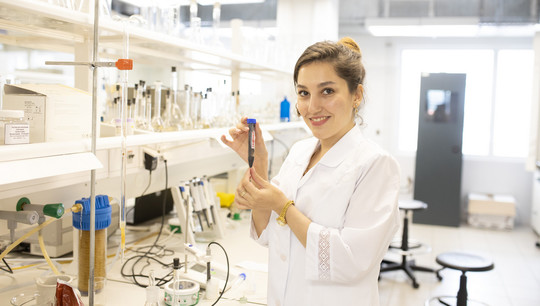Ural Federal University Presents Summary of Scientific Achievements in 2023
At the regular meeting the members of the Academic Council of UFU discussed the results of the scientific work of the university in 2023 and the tasks for the current year: the report was delivered by Alexander Germanenko, the Vice-Rector for Research. The details of the speech can be found in the latest issue of the Ural Federal Newspaper (No. 6, April 1).
“This year, the volume of R&D, which we have reported within the framework of the Priority Program 2030 and included in the Science Report 2023, amounts to 3,676 million rubles, which is almost half a billion more than last year. It is important to note that both the significant result in general and the increase are ensured by the cooperation of the university with enterprises of the real sector of the economy”, says Alexander Germanenko.
Speaking about the contribution of the institutes, the Vice-Rector noted a significant increase in the volume of scientific work at the Institute of New Materials and Technologies (from 182 million roubles in 2022 to 364 million roubles in 2023), the Institute of Chemical Engineering (199 and 240 million roubles, respectively), and the Ural Power Engineering Institute (124 and 195 million roubles). However, 86 percent of the R&D volume will still be provided by five leading institutes: The Institute of Natural Sciences and Mathematics, the Institute of New Materials and Technologies, the Institute of Physics and Technology, the Institute of Chemical Engineering, and the Ural Power Engineering Institute.
The same is partly true for publication activity. Although it is too early to summarize the results of the past year, some trends are already visible. Thus, Alexander Germanenko drew attention to the increase in the share of publications in journals due to the decrease in the share of publications in conference proceedings, as well as the increase in the number of articles published in highly rated publications. The decrease in the total number of published materials, according to the Vice Rector, is due to the improvement of their quality – the refusal to publish articles in low-rated publications.
The number of publications also includes the results of joint scientific work of specialists of UrFU and the Ural Branch of the Russian Academy of Sciences. Thus, 659 out of 2002 publications in 2023 indexed in the WoS database, i.e. 32.9%, were published in co-authorship with colleagues from the Ural Branch of the Russian Academy of Sciences. As for the Scopus database, such publications are 739 out of 2599 (28.4%). The cooperation of UrFU scientists with foreign colleagues is developing. Alexander Germanenko drew the attention of the members of the Academic Council to the growing number of studies carried out together with specialists from Saudi Arabia.
“Egypt has dropped to third place, switching positions with Saudi Arabia, while China maintains its second-place ranking in publications included in both Scopus and WoS”, notes Germanenko.
This year, the University will continue its work in all scientific areas. The focus is on maintaining progress in ongoing projects and research. The draft resolution includes the continuation of various projects and activities. These include the Priority-2030 program, the Ural-Carbon project, and scientific tasks of the Ural Interregional Research and Education Center for Advanced Production Technologies and Materials. The work also includes increasing the volume of research and development both in the interests of the real sector of the economy and within the framework of grants and programs carried out under the decisions of the Government of the Russian Federation.
To improve postgraduate studies’ efficiency and develop the dissertation council system, measures need to be taken. To enhance scientific research on a global scale, it is essential to develop scientific cooperation with BRICS countries, particularly in astronomy and materials science. Additionally, the university plans to attract foreign scientists from the CIS, Middle East, and Southeast Asia, as well as foreign PhD students to study at UrFU, primarily from friendly countries of the CIS, Middle East, Southeast Asia, South, and Latin America.

